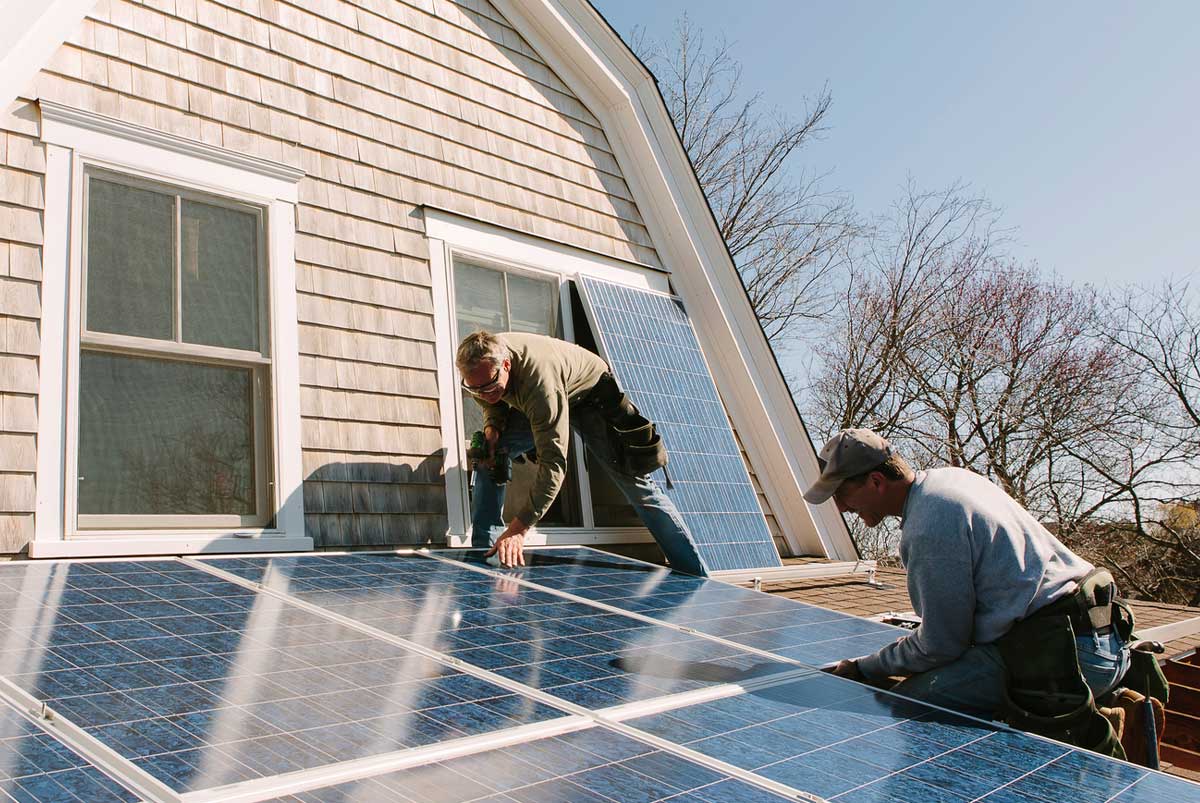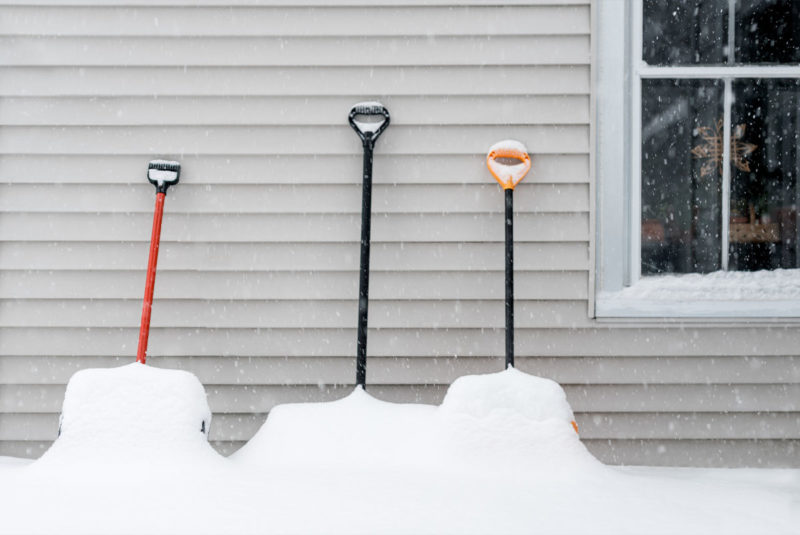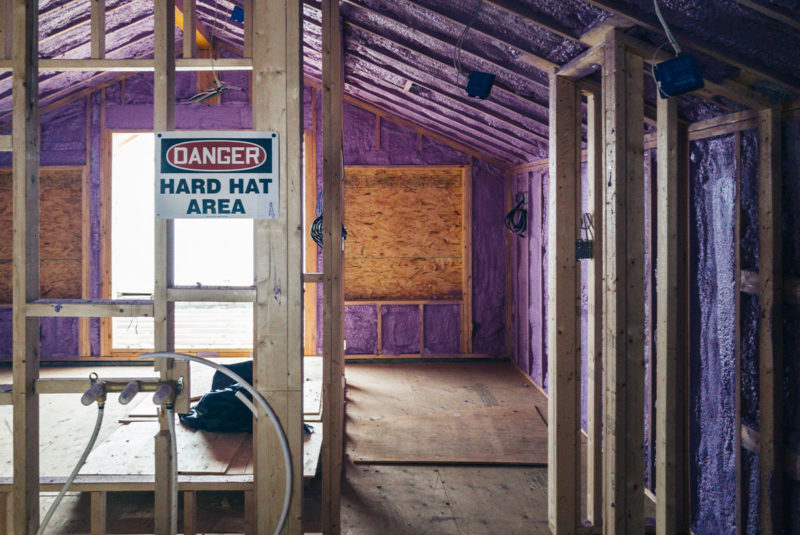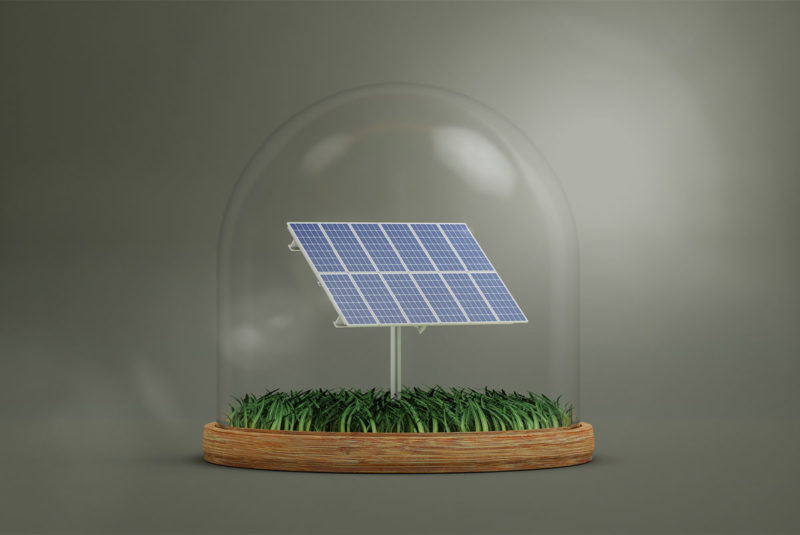Explore your mortgage options
Solar panels are a great way to save money while shrinking your carbon footprint. Typically installed on a home’s roof, solar panels convert sunlight to electricity. But they aren’t free to buy or install. So, other than writing a big check, how can you pay to put solar panels on your home?
There are ways to finance the addition of solar panels to make them more affordable. Your MoneyTips team is here to go over the various financing options. Then, you’ll have all the information you’ll need to decide the best way to move forward with your solar panel installation.
Need Funds for Home Improvements?
Apply for a home improvement loan from Rocket LoansSM and start planning your next renovation project.
Checking your options won’t affect your credit score.
How Much Do Solar Panels Cost?
The price of installing a system of solar panels varies based on what region the home is in, the type of solar panels, the type of roof you have as well as the size of the home. Electricity output is measured in kilowatts (KW), and a larger home will need a system that can generate more kilowatts (kW).
Here is an approximate breakdown of the average cost of installation for three different home sizes:
| Size of Home | Kilowatts (kW) Needed[1] | Total Installation Cost[2] |
| 1,500 square feet | 5 kW | $3,500 – $7,500 |
| 3,000 square feet | 10 kW | $7,000 – $15,000 |
| 4,500 square feet | 15 kW | $10,500 – $22,500 |
There are three main types of solar panels, and each has a different average cost to install:
Monocrystalline solar panels
These panels cost the most but are the most energy efficient. The cost is around $1 – $1.50 per watt. Each kilowatt = 1,000 watts, so a 5 kilowatt system would cost $5,000 – $7,500 to install.[2]
Polycrystalline solar panels
These are the middle-of-the-road solar panels. They are typically blue, so they’re easy to spot. The cost is around 90 cents – $1.00 per watt to install this type of solar panel system, so a 5 kilowatt system would cost $4,500 – $5,000 to install.[2]
Thin-film (amorphous) solar panels
These solar panels are the least expensive type, and they tend not to last as long as the others. They are 70 cents – $1.10 per watt to install, so a 5 kilowatt system would cost $3,500 – $5,500.[2]
How Much Money Will I Save With Solar Panels?
One of the main reasons people opt for solar panels is the savings on energy costs. On average, solar panels save homeowners anywhere from $20,000 – $134,000 over the system’s lifetime, with the break-even point being 15 – 25 years.[2]
Here are the average monthly savings.
Energy consumption is measured in kilowatt hours (kWh). Utility customers use an average of 893 kWh each month.[3] The average price per kilowatt is $13.15, making the average monthly electricity bill $117.46.[4]
On average, residential solar electricity is $0.05 per kilowatt. So that monthly bill is now $44.65.[5]
That’s an average monthly savings of $72.81 a month or $873.72 a year.
Remember, though, that solar panels convert sunlight into electricity. So homes in sunnier locations will save more money than places that don’t get a lot of sunlight.
Can I get a tax break on solar panels?
The federal solar tax credit can save you even more money. (Note that a tax credit reduces the amount of tax you’ll pay or increases your refund, saving you more than a tax deduction, which reduces your income for tax purposes.)
If you install a solar panel system on your home in 2022, you can get a federal tax break of 26% of the system’s installation cost. If you install the system in 2023, the tax break is 22%.[6]
Let’s say you’ve received a contractor estimate of $20,000 to install a solar panel system on your home. The federal solar tax credit in 2022 could reduce that cost by $5,200, making the installation $14,800. That’s a decent savings amount!
And if that weren’t enough, there might even be more tax incentives from your state, such as further credits or deductions.
Home Improvement Is Worth It
Prequalify for a personal loan from $2,000 to $45,000 from Rocket LoansSM and make your dream home a reality.
What Are the Best Ways To Finance Solar Panels?
Even with the federal solar tax credit, solar panels can cost a lot of money out of pocket. Luckily, there are financing options (sometimes called solar loans) to consider. Here are some of the most common ways to finance the installation of residential solar panels.
Personal loan
If you have good credit, a personal loan might be the best solar panel financing option. Most personal loans are fixed-rate installment loans, meaning you’ll have the same monthly payment for the loan term.
Here are some of the pros and cons of using a personal loan to finance your solar project:
PROS of a Personal Loan👍
You might be able to get the cash in as little as a day or two.
Most personal loans are unsecured, meaning you don’t have to put up property or other assets as collateral.
Sometimes, personal loans have no origination fees. This depends on the lender.
CONS of a Personal Loan👎
For the best interest rates, you’ll need excellent credit, around 740.
Borrowers with fair or bad credit will probably pay high interest rates.
Some lenders charge an origination fee, which typically runs from 1% – 10% of the loan amount.
Government home renovation loans
If you’ve got less-than-stellar credit and want to make energy-saving upgrades, government-backed loan programs could be an option for you.
These loans include the Federal Housing Administration FHA 203(k) loan, Fannie Mae HomeStyle® Renovation and Freddie Mac CHOICERenovation® loans and the FHA PowerSaver. Let’s take a quick look at some of these loans.
If you’re purchasing a fixer-upper
There are several government loans available that allow home buyers to combine a mortgage and renovation costs into one loan:
FHA 203(k) loan
The FHA 203(k) loan (also known as a federal fixer-upper loan) is a combination mortgage and renovation loan. It’s great for people interested in purchasing a single-family home and making renovations, which can include solar panel installation.
To get an FHA 203(k) loan, you’ll need a minimum credit score of 580, and a minimum down payment of 3.5%.[7] Also, the FHA will need to approve the contractor you work with.
You can borrow up to 110% of the after-renovation value of the home. The borrowing amount for an FHA 203(k) loan starts at $5,000, and you can borrow up to $35,000.[8]
Fannie Mae HomeStyle® loan
For borrowers with a minimum credit score of 620, a Fannie Mae Homestyle® loan can help you purchase and renovate a single-family home, second home or 1- to 4-unit multifamily home. Bonus: You may be able to make a down payment as low as 3%.
Eligible renovation funds are capped at either $50,000 or 50% of the appraised home value when the work is completed, whichever amount is less.[9]
Freddie Mac CHOICERenovation® loan
This loan, meant for those purchasing a fixer-upper, is almost identical to the Fannie Mae Homestyle® loan, with the main difference being the amount of funds available. For the Freddie Mac CHOICERenovation® loan, eligible funds are capped at 75% of the purchase price plus renovation costs, or 75% of the appraised home value when the work is completed, whichever amount is less.[10]
If you already own your home
These government loans help finance the addition of a solar energy system to a home you already own:
FHA Title I loan
This loan is made available through private lenders but is backed by the FHA. Most renovation projects that will improve the home and make it more livable are fair game for this loan, with the exception of luxury improvements, like a swimming pool or outdoor fireplace.
Most of these loans are unsecured under $7,500, meaning you won’t need to put up any collateral, including your home. The maximum loan amount for a single-family home is $25,000, with a maximum loan term of 20 years.[11]
You can find an FHA Title I lender in your state by calling the Department of Housing and Urban Development’s customer service center at (800) 767-7468 or TTY: (800) 877-8339.
FHA PowerSaver loan
This loan is available to homeowners specifically to upgrade to renewable energy systems. The PowerSaver loan is only available in certain states and through certain lenders.
Home equity loans and HELOCs
Borrowing against your home’s equity is another solar financing option. Equity is the market value of your home minus what you still owe on your mortgage. Most lenders will let you borrow up to 85% of your available equity.
The two options for borrowing equity are a home equity loan and a home equity line of credit (HELOC). They are similar, but there are key differences between the two.
A home equity loan is a fixed-rate installment loan. You’ll get a lump sum and pay it off in monthly payments.
A HELOC, on the other hand, typically has a variable rate, meaning your interest rate can go up or down with market conditions. HELOCs are also revolving credit, so you only pay interest on what you borrow.
For either a home equity loan or a HELOC, you’ll typically need a minimum credit score of around 680, depending on the lender.
Solar leasing
With solar leasing, you lease or rent solar panels rather than buying them.
Some solar companies have no cash down lease options. Solar leasing could be a good option for people who want to take advantage of the savings that solar panels offer, but don’t have the cash to dedicate to the installation upfront and would rather not borrow.
However, you’ll be missing out on any solar tax credits or savings if you go this route. Additionally, many solar leasing companies include an escalator clause in their leases, which increases the cost per kWh each year. Depending on your agreement, with a typical 20-year lease, your electricity could end up costing just as much as it would without the solar energy system.
Are Solar Panels Worth It?
Is installing solar panels on your home worth the cost? You’ll have to crunch the numbers yourself to make that determination. Be sure to take into account how much money you’re expected to save each year and consider tax credits and other incentives available to you.
It’s also a good idea to talk to people who have had panels installed. How do they like it? Are they saving a lot of money? Are there significant repair or upkeep costs that might be a downside? What solar financing, if any, did they choose?
You should also consider how long you plan to stay in the home. If you won’t be there long enough to reap the energy-savings solar panels offer, it may just be better to forego the opportunity.
Protect the Planet and Your Pockets
Putting in solar panels can be an energy-saving and cost-saving decision. How to finance the panels is another important decision that depends on your family’s financial situation. Just remember to get your finances in the strongest shape possible before – and during – your loan application.
See What You Prequalify For
Get prequalified offers for personal loans from Rocket LoansSM within seconds. Like what you see? Same-day funding is available.
Checking your options won’t affect your credit score.
The Short Version
- The price of installing a system of solar panels varies based on what region the home is in, the type of solar panels, the type of roof you have as well as the size of the home
- Even with the federal tax credit, solar panels can cost a lot of money out of pocket. Luckily, there are financing options to consider
- A personal loan might be the best solar panel financing option if you have good credit. Most personal loans are fixed-rate installment loans
Solar Action Alliance. “Solar Panel Cost: Residential Analysis Breakdown.” Retrieved May 2022 from https://solaractionalliance.org/residential-solar-panel-cost/
Home Advisor. “How Much Are Solar Panel Prices?” Retrieved May 2022 from https://www.homeadvisor.com/cost/heating-and-cooling/solar-panel-prices/#solar-module-prices-by-type
U.S. Energy Information Administration. “FREQUENTLY ASKED QUESTIONS (FAQS).” Retrieved May 2022 from https://www.eia.gov/tools/faqs/faq.php?id=97&t=3#:~:text=How%20much%20electricity%20does%20an,about%20893%20kWh%20per%20month
U.S. Energy Information Administration. “2020 Average Monthly Bill- Residential.” Retrieved May 2022 from https://www.eia.gov/electricity/sales_revenue_price/pdf/table5_a.pdf
Office of Energy Efficiency and Renewable Energy. “2030 Solar Cost Targets.” Retrieved May 2022 from https://www.energy.gov/eere/solar/articles/2030-solar-cost-targets
Office of Energy Efficiency and Renewable Energy. “Homeowner’s Guide to the Federal Tax Credit for Solar Photovoltaics.” Retrieved May 2022 from https://www.energy.gov/eere/solar/homeowners-guide-federal-tax-credit-solar-photovoltaics
U.S. Department of Housing and Urban Development. “MAXIMUM MORTGAGE LIMITS 2022.” Retrieved May 2022 from https://www.hud.gov/program_offices/housing/sfh/lender/origination/mortgage_limits
U.S. Department of Housing and Urban Development. “203(k) Rehab Mortgage Insurance.” Retrieved May 2022 from https://www.hud.gov/program_offices/housing/sfh/203k
Fannie Mae. “HomeStyle® Renovation Mortgage.” Retrieved May 2022 from https://singlefamily.fanniemae.com/media/5041/display
Freddie Mac. “CHOICERenovation® FAQ.” Retrieved May 2022 from Freddie Mac. https://sf.freddiemac.com/faqs/choicerenovation-faq
U.S. Department of Housing and Urban Development. “FIXING UP YOUR HOME AND HOW TO FINANCE IT.” Retrieved May 2022 from https://www.hud.gov/program_offices/housing/sfh/title/sfixhs




